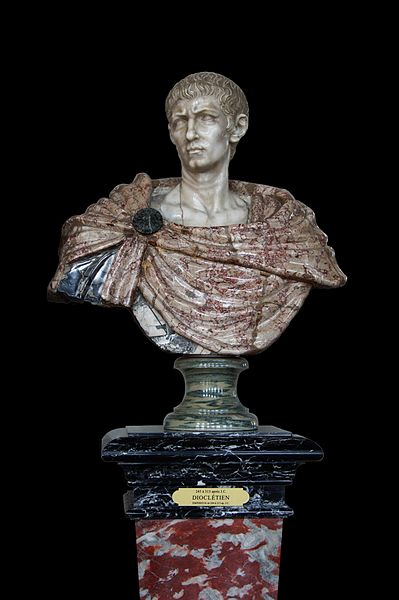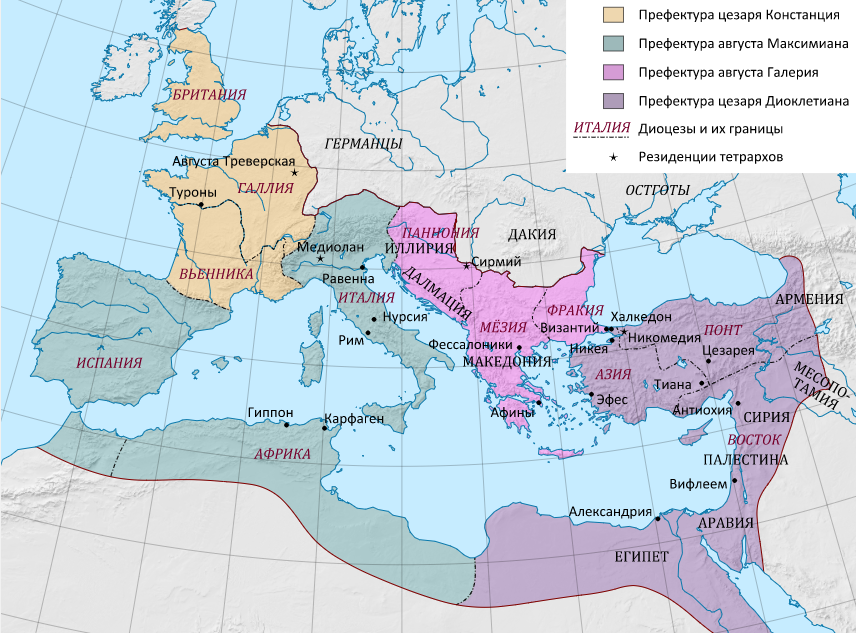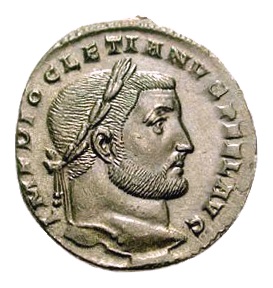Diocletian
Gaius Aurelius Valerius Diocletianus was a roman emperor who ruled from November 20, 284 AD, to May 1, 305 AD. He was born as Diocles (Dioclus) on December 22, 244 AD, in Dalmatia, and he passed away on December 3, 311 AD, in Salonae. Diocletian's rise to power marked the end of the Crisis of the Third Century in Rome. He established a firm rule and abolished the fiction that the emperor was merely the first among senators (Princeps), declaring himself the absolute ruler. His reign marked the beginning of the Dominate period in Roman history.
Diocletian was born around 245 AD in the vicinity of Scodra in a place called Dioclea (now within the territory of Montenegro) and came from a lower social class (his father was a freedman). Thus, the Roman emperor Diocletian was the grandson of a slave. The birthdate of Diocletian is believed to be December 22, according to Timothy Barnes. His original name was Diocles (or Valerius Diocles), which he changed to the more grandiose name Diocletian upon becoming emperor. Joining the military service as a common soldier during the reign of Gallienus, he quickly climbed the career ladder. By conducting campaigns from one end of the Roman Empire to another, he familiarized himself with the state of affairs in the empire. While stationed in Gaul with his legion, he allegedly received a prophecy from a druidess that he would become emperor if he killed a wild boar (aper). By the time of Probus, he was already a governor in Moesia. When Emperor Carus went to war with the Persians, Diocletian accompanied him as the commander of the domestici (comes domesticorum). However, when Carus died unexpectedly beyond the Tigris River and his son, Numerian, was treacherously killed by his father-in-law, the Praetorian Prefect Aper, on the shores of the Bosporus in Chalcedon, the soldiers arrested Aper in chains, and their commanders proclaimed Diocletian as emperor (September 17, 284 AD).
 Emperor Diocletian, 3rd century AD
Emperor Diocletian, 3rd century AD
The Beginning of Rule
Diocletian initiated a new era in the Roman Empire, making the imperial power not only de facto but also de jure unlimited—an absolute monarchical authority known as the Dominate. The emperor no longer shared power with the Senate; he himself became the source of all authority, superior to all laws and inhabitants of the empire, regardless of their rank.
The first act of the new emperor was the personal execution of Aper, carried out in front of the troops. He spared none of his enemies, confirmed them in their positions, and even surprised his contemporaries with his mildness after defeating Carinus, another son of Emperor Carus, in Moesia. This gentleness was uncommon among victors in civil wars in Rome. By defeating Carinus, unity in the empire was restored. However, due to challenging circumstances, Diocletian took his old friend Maximian as his helper, granting him the title of Caesar at first, and after suppressing the Bagaudae peasant uprising in Gaul (285), he elevated him to the rank of Augustus (286). While Maximian defended Gaul against the Germans, Diocletian focused on the East, ensuring the security of the empire's borders in Asia and Europe. Initially stationed in Nicomedia towards the end of 285 and the beginning of 286, Diocletian moved to Syria to deal with Persia. When circumstances in the East turned favorable for Rome, he turned from Asia to Europe to protect the Danube frontier from Sarmatian attacks. He managed to defend the previous border along the Danube (Dacia) and secure the province of Raetia for Rome. The emperors postponed their triumphant arrival in Rome but each assumed a new epithet: Diocletian began adding the Latin term "Jovius" (Jupiter) to his names, while Maximian took on "Herculius" (Hercules). After defeating the Saracens (Arabian Bedouins) who had been ravaging the borders of Syria, Diocletian returned to Europe (late 290).
The division of the empire into four parts led to a transformation of the entire provincial administration. The empire was fragmented into a large number of administrative districts. The entire empire was divided into 12 dioceses, each of which was further divided into provinces. The smallest, Britain, was divided into four provinces, while the largest, the East (Oriens), was divided into 16. This administrative structure required an increase in the number of officials, which correspondingly led to an increase in the taxation burden on the population. Nevertheless, this reform met the needs of the time and was maintained after Diocletian.
 Roman Empire during the reign of Diopletian
Roman Empire during the reign of Diopletian
Tetrarchy
In early 291, during a meeting in Milan with Maximian, who had arrived from Gaul, it was decided to elect two Caesars, with the choice falling on Constantius Chlorus and Galerius Maximianus. The inclusion of two new figures in the imperial power was prompted by the fact that during constant wars and uprisings in various parts of the empire, the two emperors were unable to manage affairs in remote areas of the empire. To strengthen the mutual connection with the new emperors, Diocletian and Maximian entered into close kinship with them. Constantius divorced Helena, the mother of Constantine, and married Maximian's stepdaughter, Theodora, taking control of Gaul and Britain. Galerius also divorced his previous wife and married Galeria Valeria, the daughter of Diocletian, and assumed control over all of Illyricum. Specifically for Maximian, in addition to the overall supervision of the West, he was granted authority over Italy, Africa, and Spain. The regions east of Italy remained under the care of Diocletian. At the same time, he brought in Constantine, Constantius's 18-year-old son from Helena, who followed him everywhere during his campaigns in the East. The formal inclusion of the two Caesars into imperial power took place on March 1, 293. The division of regions for governance was not so much a division of the empire itself but a facilitation of administrative management, with Diocletian still standing at the head of it, at least morally.
 Coin of Follis Dioctetiana, 3rd century AD
Coin of Follis Dioctetiana, 3rd century AD
The Restoration of the Empire
One of the new emperors immediately faced the difficult task of wresting Britain from the usurper Carausius, whom Diocletian and Maximian had been forced to tolerate until then. Constantius was able to achieve this, as well as pacify Gaul. Maximian had to defend the Rhine borders against Germanic invasions (296) and the following year, suppress the Moors in Africa. Galerius was tasked, under the direct guidance of Diocletian, with defending the lower Danube frontier, where the Iazyges, Carpi, Bastarnae, and Juthungi gave the Roman troops quite a challenge. After establishing peace in the European East, Diocletian was supposed to travel to Egypt, which was then under the control of the usurper Achilleus.
After an eight-month siege, Diocletian captured Alexandria in 298. At the same time, he took measures to improve the administration of Egypt by dividing it into three provinces (the Thebaid, Aegyptus Jovia, and Aegyptus Herculia) and winning the support of the masses by distributing bread to the poor at public expense. During this time, an unusual edict was issued, ordering the collection and burning of all ancient books that taught how to make gold and silver. This was explained as Diocletian's desire to destroy the source of wealth and the arrogance of the Egyptians.
Finally, through a treaty with the Blemmyes and Nobatae, he secured the southern border of Egypt from attacks by these barbarian tribes, promising to pay them an annual tribute. During the Egyptian campaign, he entrusted Galerius to march into Mesopotamia against the Persians, who were at that time supporting a Roman-backed contender for the independent Armenian throne, Tiridates. Galerius suffered a defeat and fled to meet Diocletian, who, as punishment, made him walk one mile on foot behind his carriage. Galerius' second campaign was more successful. He defeated the Persians in Armenia, forcing them to cede five provinces beyond the Tigris to the Romans (297).
In 303, Diocletian initiated persecutions against Christians, resulting in the martyrdom of many. The emperor ordered the closure of churches and the destruction of books.
Diocletian had the least success in his efforts to maintain paganism as the state religion and in his fierce battle against Christianity. In the year of his death, Emperor Constantine the Great issued an edict granting everyone the right to freely convert to Christianity. The assessment of Diocletian's personality and activities varies among pagan and Christian writers. Even pagan writers criticize him for introducing Eastern pomp into the imperial court etiquette and for the arrogant aura he surrounded himself with, demanding people to bow before him and presenting himself to his subjects as a deity. The colossal ruins of Diocletian's Baths in Rome are a tangible monument to his reign, believed to have been built by Christians condemned to death.
Results
Thus, peace was gradually restored both within and on the borders of the empire, something that had been absent for a long time. Diocletian's era was proclaimed by contemporary rhetoricians as the return of the Golden Age. After twenty eventful years, the emperor finally arrived in Rome, but the modesty of the entertainments he offered to the people resulted in general mockery. Shortly after, Diocletian left Rome and went to his favorite residence in Nicomedia. During his journey, he fell ill, and upon the insistent advice of Galerius, he formally relinquished power in Nicomedia on May 1, 305. Galerius and Constantius assumed the title of Augustus, while Severus and Maximinus were promoted to the rank of Caesar.
Diocletian spent the remainder of his life in his homeland of Illyria, in his estate in Salonae, where he lived in seclusion for 6 years. When Maximian and Galerius attempted to persuade him to return to power, the former emperor refused, remarking that if they could see the cabbage he had grown, they would not bother him with their offers. The last years of Diocletian's life were marred not only by physical suffering but also by the rudeness of the new rulers, especially Constantine. Diocletian died under unknown circumstances (according to Aurelius Victor, from poison; according to Lactantius, from hunger and illness; according to Eusebius, after a prolonged illness and decrepitude) in 311.
Related topics
Roman Empire, Dominate, Roman Emperors, Constantine the Great, Struggle between Paganism and Christianity
Literature
- Bernhardt, «Geschichte Roms von Valerian bis zu Diocletians Tode» (B., 1867);
- Preuss, «Kaiser D. und seine Zeit» (Лпц., 1869);
- Bernhardt, «Untersuchung über Diocletian im Verhältniss zu den Christen» (B., 1862);
- Mason, «The Persecutions of D.» (Л., 1876);
- Allard, «La persécution de D. et le triomphe de l’Eglise, d’après les documents archéologiques» (Пар., 1890);
- Belser, «Zur Diocletianischen Christenverfolgung» (Тюбинген, 1891);
- Casagrandi, «Diocleziano» (Ген., 1876);
- Cohen, «L’abdicazione di D.» (1887);
- Morosi, «L’abdicazione dell’imp. D.» (1880).
- Knyazkiy I. The Emperor Diocletian and the Decline of the ancient world. - Alethea, 2010. - 144 p. - (Antique Library. Research). — 1000 copies. — ISBN 978-5-91419-310-9.
- Stephen Williams. Diocletian. Restorer of the Roman Empire / Translator Irina Khazanova, Moscow: Evraziya, CLIO, 2010, 368 p. (Clio). — 2000 copies. — ISBN 978-5-91852-058-1, 978-5-906518-17-0.
- Novitskaya K. I., Nekotorye voprosy agrarnoi politiki nachala Dominata, Vestnik drevnoi istorii, 1961, No. 4;
- S. I. Arkhangelsky, Diocletian's Decree on taxes, Nizhny Novgorod, 1928;
- Seston W., Dioclétien et la tétrarchie, P., 1946.
- Diocletian / / Encyclopedia of Brockhaus and Efron : in 86 volumes (82 volumes and 4 additional ones). - St. Petersburg, 1890-1907.


